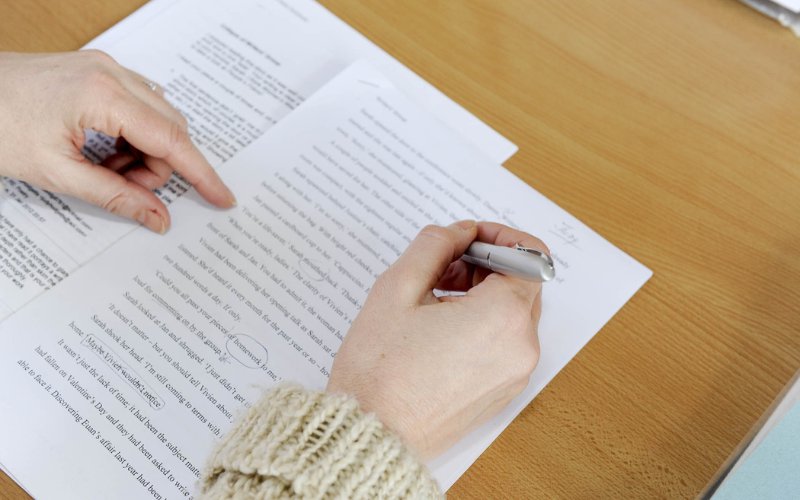How Can I Improve My IELTS Writing Skills? Simple Tricks That Work

Getting the score you need in IELTS means performing your best across all four sections of the exam. This means understanding the format of the exam and implementing the right tips and tricks to help you succeed.
The IELTS exam consists of four sections: Listening, Reading, Writing and Speaking. Each stage has a certain amount of points, which must be added up to get the required score.
To get the required score, you need to know what the examiner is looking for in each section and do your best to meet those criteria. In the listening and reading sections, you need to show that you understand the main ideas of the passages and questions. The writing section requires you to demonstrate your ability to write a clear and concise essay. And in the speaking section, you need to demonstrate your speaking skills.
This piece will guide you to know how best you can improve your writing skills in the IELTS exams whether you are a fresh student or returning to retake the exam.
Details About The IELTS Writing Section
Details About The IELTS Writing Section
The IELTS Writing section is designed to assess your ability to communicate clearly and effectively in written English. This section has two tasks to complete and you have 60 minutes to complete both tasks.
Task 1 is a writing task in which you will be asked to describe a graph, table, chart, or diagram. You must write at least 150 words to complete this task.
Task 2 is an essay task asking you to write about a specific topic. You need to write at least 250 words to complete this task.
Both tasks require you to use a range of vocabulary and grammatical structures. Your ability to use these language skills effectively to communicate your ideas clearly and fluently will be assessed.
There are four key criteria IELTS uses in gauging your writing skills and it is important that you understand these criteria to help you achieve the best score in this section. There are four criteria that IELTS uses in gauging your writing skills. They are:
- grammatical range and accuracy,
- lexical resources,
- cohesion & coherence, and
- task achievement.
Proven And Effective Tricks And Tips
Proven And Effective Tricks And Tips To Improve Your Writing Score
Now that we have discussed the writing section and what it entails here are the tips you can implement to improve your writing score.
Use Your Time Wisely When During The IELTS Writing Exam
One of the best ways to score high in the IELTS writing section is to make use of your time wisely. This means planning your essay before you start writing and making sure you use your time wisely during the essay itself.
Here are some tips to make the most of your time in the IELTS Writing section:
- Read the question carefully and make sure you understand what is being asked.
- Make a quick outline of your essay before you start writing. This will keep you on track and make sure you cover all the points you need.
- Use your time wisely during the essay itself. Don’t spend too long on one section, and make sure you leave yourself enough time to proofread and edit your work.
- Practice timed essays before your exam so you are used to formatting
Ensure You Check For The Number Of Words You Are Required To Write
The IELTS writing section is a challenging part of the exam and one of the main things that can trip up students is not meeting the word count requirement. I need to write 150-250 words depending on the task given.
This may not seem like a big deal, but if you don't plan and structure your essay carefully, it can go over or under the character limit.
If you go over the word limit, your essay will be penalized. Likewise, if you don't write enough words, you will also lose marks. So how do you make sure you're achieving the right word count?
To start with, you want to comprehend the various kinds of assignments in the IELTS composing segment and the number of words they that require. Then, you can utilize a few techniques to help you plan and construction your paper.
Grasp The Undertaking And Read The Directions Cautiously
The IELTS test is a trial of your English level and the composing part is a significant piece of the test. To find success in the composing part, you should have the option to painstakingly comprehend and adhere to directions.
One of the main things to remember while composing is to underline or feature watchwords in your portrayal. This permits you to remain on subject and address the issues analysts are searching for.
In this way, when you plunk down to do the composing part of the IELTS test, make certain to peruse the directions cautiously and underline or feature the catchphrases. This will assist you with giving your all on the test and getting the score you need.
Take Time To Organise Your Ideas Logically
Another tip is to Carve out the opportunity To Arrange Your Thoughts Intelligently while endeavoring the composing segment of the IELTS exam preparation. Many students make the mistake of rushing through their essays without taking the time to organize their thoughts. This can lead to a disorganized and incoherent essay.
Taking the time to plan your essay before you start writing will help organize your thoughts and help your essay run smoothly. Start by brainstorming your ideas and then organise them into a logical order. Once you have a clear plan, you can start writing your essay. Remember to stay on topic and support your points with evidence. Taking the time to organize your ideas before you start writing will help you create a clear and well-organized essay.
Know Your Approach Each Task Requires A Specific Approach
When it comes to the IELTS Writing section, knowing your approach is essential to success. Each task on the IELTS Writing test requires a different approach in order to achieve a high score.
For example,
Task 1 of the IELTS Writing test is a report writing task, which requires a different approach than
Task 2, is an essay writing task. Task 1 should focus on organizing your ideas and presenting them clearly and concisely. Task 2, on the other hand, should focus on developing your arguments and using supporting evidence to support your claims.
Knowing which approach to take for each task on the IELTS Writing test will help you maximize your score. Be sure to practice each type of task so that you are familiar with the different approaches and can use them.
Think About Style Either Formal, Semi-Formal Or Informal As It Determines Your Grammatical Structure
The writing section of IELTS can be daunting, especially when you don't know what tone to use in your essay. Formal, semi-formal, or informal? It's important to choose the right tone for your IELTS essay, as using the wrong one can result in a lower score.
Here's a quick tip to help you choose the right tone for your IELTS essay: think about your audience. Who will be reading your essay? If you're writing for an academic audience, then a formal tone is appropriate. However, if you are writing for a more general audience, a semi-formal or informal tone is more appropriate.
Remember, using the right tone in your IELTS essay will help you get a higher score. So choose wisely!
Twofold Really look at Your Work For Any Blunder
Another tip is to Check your work for any errors in grammar or spelling when attempting the writing section IELTS exam. Examples: capitalize, use correct spelling of words, use correct tenses for verbs, use active voice instead of passive voice, etc.
Writing Section Practice Question
The IELTS writing section is designed to test your ability to communicate effectively in written English. To succeed in this section, you should practice writing essays in a variety of genres.
Here are a few activities to kick you off:
1. You were approached to give a show on the advantages of concentrating abroad to a gathering of secondary school understudies. What focuses could you remember for your discussion?
2. You have been approached to compose an article for a sightseeing publication about the most ideal getaway spots in your country. What focuses could you remember for your article?
3. You have been approached to compose a report for your organization on the upsides and downsides of carrying on with work abroad. What are the focuses to remember for the report?
Look at this The Secrets of a Fluent English Speaker in 2023

















.png)